

'How I minimised marking and reclaimed my weekend' Stand in a school staff car park on a Friday afternoon, watch the teachers leave and count the number of them who emerge blinking into the sunlight burdened by piles of books.
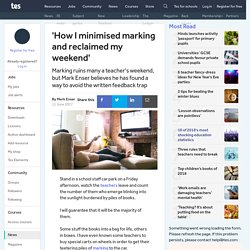
I will guarantee that it will be the majority of them. Some stuff the books into a bag for life, others in boxes. I have even known some teachers to buy special carts on wheels in order to get their teetering piles of marking to the car. Some of these books will never get further than the hall, where they will sit all weekend in silent reproach and cast a shadow over any attempt to relax. Others will be hastily marked on a Sunday morning, while the kids are busy, or will drag out and dominate the whole weekend. How did it come to this? A report from the Independent Teacher Workload Review Group, titled Eliminating Unnecessary Workload Around Marking, hit the nail on the head when it said: Here is the heart of the issue.
Reduce the need. Mark My Words. I work four days a week as an English Teacher, SENCO, Head of Teaching and Learning and Senior Leader at a brand new, start up school.
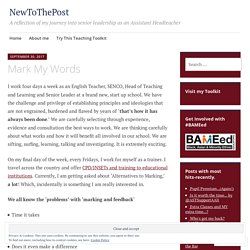
We have the challenge and privilege of establishing principles and ideologies that are not engrained, burdened and flawed by years of ‘that’s how it has always been done.’ We are carefully selecting through experience, evidence and consultation the best ways to work. We are thinking carefully about what works and how it will benefit all involved in our school. We are sifting, surfing, learning, talking and investigating. It is extremely exciting. On my final day of the week, every Fridays, I work for myself as a trainer. Marking-review-for-sharing. Fake Headteacher: Marking – Newsletter No.4 – Fake Headteacher. Dear Staff, Thank you for allowing me to look at your books this week.
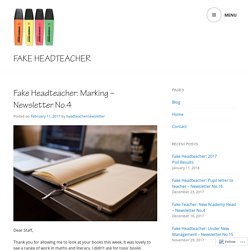
It was lovely to see a range of work in maths and literacy. I didn’t ask for topic books because these subjects are not as important even though I know you work just as hard to make these books look fantastic. I asked for three books of differing abilities. This gave you plenty of time to ensure these particular books looked as good as possible – by adding in extra bits of marking that you didn’t do at the time.
Overall, I was fairly disappointed with the standard of marking in the books I looked at. In addition, I was staggered to see a ‘success criteria’ list with only four bullet points on. I was hugely disappointed that teachers were not using the marking code fully when marking their books. In fact, the child had clearly demonstrated a good use of adverbs in the same piece of work but the teacher just wrote ‘Well done; good use of adverbs.’ Why don’t you ask pupils to do their own marking? My daughter recently said the words that every school leader dreads to hear: “Daddy, when I grow up, I want to be a teacher.”
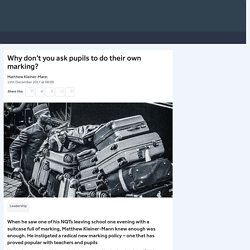
Don’t get me wrong: I love my job. But teaching has a workload problem. The last thing I wanted was to watch my daughter drowning under the piles of planning and marking that I saw staff struggling with every day. As an executive headteacher, dictating the marking policy for three primary schools in Enfield, North London, it should have occurred to me then that I might be part of the problem. However, the penny didn’t drop until a couple of days later when I ran into one of my NQTs wheeling a suitcase out of school on a Friday afternoon.
Onebetweentwo - Blog. The feedback continuum: why reducing feedback helps students learn. The effects of feedback are more complex than we often realise.
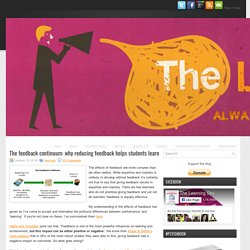
While expertise and mastery is unlikely to develop without feedback it’s certainly not true to say that giving feedback results in expertise and mastery. There are few teachers who do not prioritise giving feedback and yet not all teachers’ feedback is equally effective. My understanding of the effects of feedback has grown as I’ve come to accept and internalise the profound differences between ‘performance’ and ‘learning’. If you’re not clear on these, I’ve summarised them here. Hattie and Timperley point out that, “Feedback is one of the most powerful influences on learning and achievement, but this impact can be either positive or negative.” It’s interesting to consider the view from cognitive psychology. This might seem on first reading to contradict your lived experience. In the past I’ve used the analogy of navigation to explain this. This then is my suggestion for a feedback continuum.
Stop writing feedback comments…..and see what happens! We are constantly trying out new ideas to ease workload and marking/feedback is always one area that my colleagues are keen to swop and share ideas on.

I know that others have the same concerns and that our huge blogs of shared practice are by far the most read, borrowed from and commented upon that we have published externally. I’m not going to put links in this post as they are all on our web-site and we are moving on at a rate of knots anyway. Over the Whit holiday I decided that it was time to try to suggest that we made a positive move towards trialling non written feedback. We had played at it with some great ideas already running and we had shared blogs from other schools such as Michaela to look at ideas from elsewhere whilst also setting up a well-being group and trying to reduce workload in key areas such as data collection. 10 Marking and Feedback Strategies. What feedback techniques could you use that make students act on feedback?

There are a few days left before the end of half-term and feedback and marking will be required before the holidays begin. Why not try some of the following and avoid unnecessary marking in your own time. Recently, I purchased The Sketchnote Handbook: The Illustrated Guide to Visual Notetaking by Mike Rohde; sourced to help develop my blogs and tweets into content that is more interesting and engaging for everyone.
Verbal feedback: Telling ’em what they need to do. Giving feedback the ‘Michaela’ way. What kind of feedback moves students on? Despite careful planning and checks for understanding during the lesson, students’ work will include slips, mistakes and misconceptions. Each student will have adopted different interpretations of the task, misspelled different words and reached a different point in a journey towards excellence. When we come to provide feedback, what will help? Our feedback will reflect the nature of gaps in student learning.
An error may reflect one of several underlying causes: “It could be a slip – that is, a careless procedural mistake; or a misconception, some persistent conceptual or procedural confusion (or naive view); or a lack of understanding in the form of a missing bit of conceptual or procedural knowledge, without any persistent misconception. Guiding student improvement without individual feedback. Feedback seems extremely powerful. It is “among the most common features of successful teaching and learning” with an average effect size of 0.79, “twice the average effect of all other schooling effects (Hattie, 2012: 115-6).” Such meta-analyses are problematic (see, for example, Wiliam, 2016) and more recent reviews have offered lower effect sizes, but the overall picture is clear: “Good feedback can significantly improve learning processes and outcomes (Shute, 2008).”
Anders Ericsson emphasises the importance of feedback and guided improvement in his work on expert performance: “Deliberate practice involves feedback and modification of efforts in response to that feedback (Ericsson and Pool, 2016: 99).” Providing effective feedback is problematic however. “While feedback is among the most powerful moderators of learning, its effects are among the most variable (Hattie, 2012: 115).” Providing effective feedback to individual students is problematic for practical reasons too.